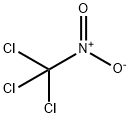
Trichlornitromethan
Bezeichnung:Trichlornitromethan
CAS-Nr76-06-2
Englisch Name:Trichloronitromethane
CBNumberCB4377500
SummenformelCCl3NO2
Molgewicht164.38
MOL-Datei76-06-2.mol
Synonyma
Trichlornitromethan
Chlorpikrin
Nitrochloroform
Trichlornitromethan physikalisch-chemischer Eigenschaften
| Schmelzpunkt | -64°; mp -69.2° (corr) |
| Siedepunkt | 112 °C |
| Dichte | 1.657 |
| Dampfdruck | 18.3 at 20 °C (Meister, 1988) |
| Brechungsindex | 1.461 |
| storage temp. | 0-6°C |
| Löslichkeit | Miscible with acetone, benzene, carbon disulfide, carbon tetrachloride, ether, and methanol (Worthing and Hance, 1991) |
| Aggregatzustand | Oily Liquid |
| Wasserlöslichkeit | 2,270 mg/L at 0 °C (Gunther et al., 1968) 1.621 g/L at 25 °C (quoted, Windholz et al., 1983) |
| Merck | 13,2175 |
| BRN | 1756135 |
| Henry's Law Constant | 2.44 (static headspace-GC, Welke et al., 1998) |
| Dielectric constant | 7.3200000000000003 |
| Expositionsgrenzwerte | NIOSH REL: TWA 0.1 ppm, IDLH 2 ppm; OSHA PEL: TWA 0.1 ppm; ACGIH TLV: TWA 0.1 ppm, STEL 0.3 ppm. |
| Stabilität | Stable. May decompose violently if heated. Large volumes of this chemical may be shock-sensitive. Reacts violently with sodium methoxide, propargyl bromide and aniline. Incompatible with 3-bromopropyne, strong oxidizers, plastics, rubber, iron, zinc and other light metals. |
| LogP | 2.090 |
| CAS Datenbank | 76-06-2(CAS DataBase Reference) |
| NIST chemische Informationen | Chloropicrin(76-06-2) |
| Kennzeichnung gefährlicher | T+ |
| R-Sätze: | 22-26-36/37/38 |
| S-Sätze: | 36/37-38-45 |
| RIDADR | UN 1580 |
| OEB | C |
| OEL | TWA: 0.1 ppm (0.7 mg/m3) |
| WGK Germany | 1 |
| RTECS-Nr. | PB6300000 |
| HazardClass | 6.1(a) |
| PackingGroup | I |
| HS Code | 29049030 |
| Giftige Stoffe Daten | 76-06-2(Hazardous Substances Data) |
| Toxizität | Acute oral LD50 for rats 250 mg/kg (RTECS, 1985). |
| IDLA | 2 ppm |

